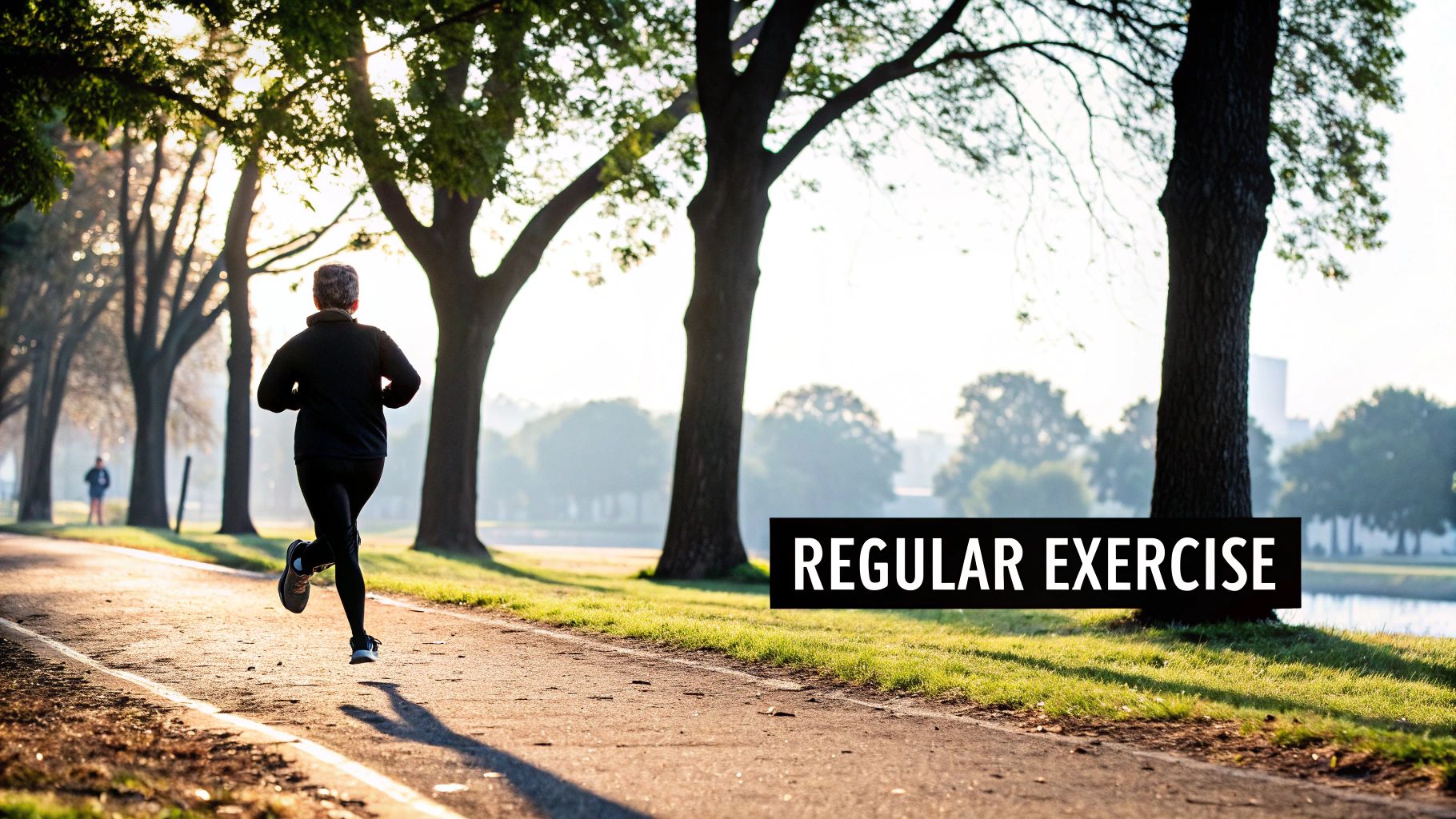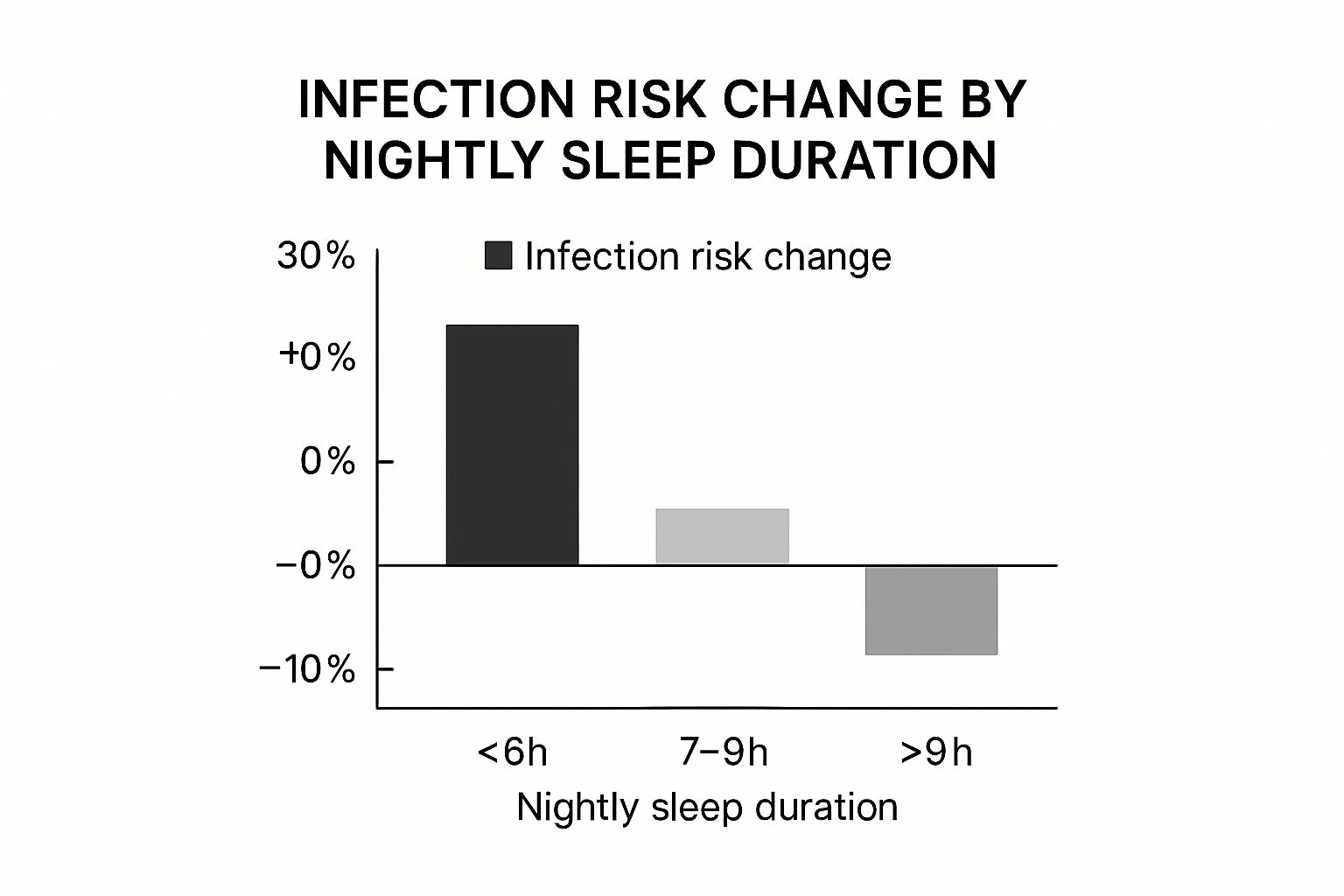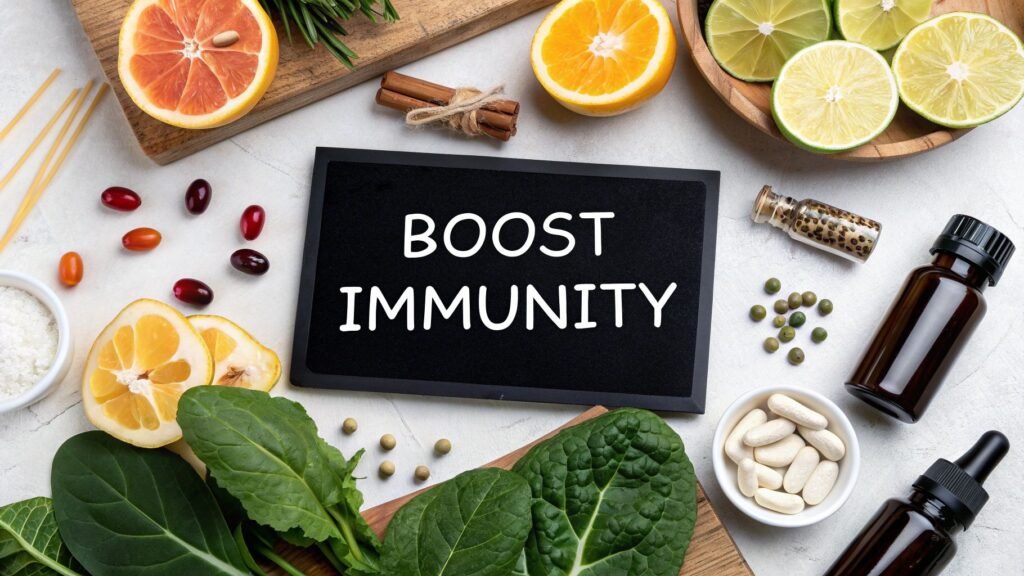A resilient immune system isn't about some secret formula or magic supplement; it's the result of consistent, daily habits. Think of it as building a strong foundation for your health, brick by brick. The most impactful things you can do involve a nutrient-dense diet, restorative sleep, smart stress management, and regular movement.
When you nail these fundamentals, you’re giving your body’s natural defenses the exact tools they need to perform at their best.
Your Practical Guide to a Stronger Immune System

So, where do you even start? It can feel like a lot, but the core principles are actually quite simple and grounded in your everyday choices. Your immune system is your personal defense force—a brilliant, complex network of cells and organs that stand guard against germs, viruses, and toxins.
The goal isn't to "boost" it into some unnatural, hyperactive state. It’s all about maintaining its delicate balance so it can do its job effectively.
When your system is balanced, it’s a sharp, efficient machine. When it's not, you might notice you're catching every bug that goes around or that it takes you forever to bounce back. The great news is you have more control than you think over keeping this system humming along.
The Four Pillars of Immunity
True, lasting immune resilience is built on four core pillars. These aren't quick fixes; they are foundational habits that work together to keep you healthy. Focusing on just one while ignoring the others won't get you very far. You need all four working in harmony.
Here's a quick look at the core lifestyle components that have the biggest impact on immune function.
Four Pillars of a Resilient Immune System
| Pillar | Why It Matters | Actionable First Step |
|---|---|---|
| Nutrition | Provides the raw materials (vitamins, minerals) your body needs to build and deploy immune cells. | Add one extra serving of colorful vegetables (like bell peppers or leafy greens) to your dinner tonight. |
| Sleep | This is when your body does its most important repair work and produces key immune proteins called cytokines. | Set an alarm for 30 minutes before your desired bedtime to start a wind-down routine (no screens!). |
| Stress Management | Chronic stress releases cortisol, a hormone that actively suppresses your immune system over time. | Practice 5 minutes of deep belly breathing when you feel overwhelmed. Inhale for 4 counts, hold for 4, exhale for 6. |
| Movement | Gentle, regular exercise improves the circulation of immune cells, helping them patrol your body more effectively. | Go for a brisk 15-minute walk during your lunch break. |
By tending to each of these pillars, you create a powerful synergistic effect that supports your body from every angle.
I often see people chugging Vitamin C packets while surviving on five hours of sleep. That’s a classic mistake. You can't supplement your way out of a poor lifestyle. For real results, you have to support all four pillars at once.
This guide is your roadmap. We're going to break down each pillar into simple, actionable steps—no confusing jargon, just practical advice. When you see how these small, consistent efforts build up over time, you’ll realize that a stronger immune system is well within your reach.
Your Diet is Your First Line of Defense

When we talk about "eating healthy," it's more than just a vague wellness tip. The food on your plate is quite literally the raw material your body uses to build and maintain its defense systems. Think of it as the supply chain for your internal army; without the right fuel, your immune cells simply can't perform at their peak when a threat appears.
By making a few conscious choices at the grocery store, you can directly influence how well your body fights off illness. This isn't about restrictive dieting, but rather about arming your system with the specific nutrients it craves.
The Micronutrient All-Stars for Immunity
Your immune cells work hard and have a high metabolic rate, meaning they burn through nutrients quickly. To keep them ready for action, a steady supply of key vitamins and minerals is non-negotiable.
Here are the heavy hitters I always recommend my clients focus on:
- Vitamin C: An antioxidant powerhouse, Vitamin C is famous for a reason. It directly supports the production and function of your white blood cells. Look beyond just oranges—you'll find it in abundance in bell peppers, broccoli, and strawberries.
- Vitamin D: Known as the "sunshine vitamin," this one is a master regulator of immune responses. While sunshine is the best source, you can also find it in fatty fish like salmon, fortified milk, and egg yolks.
- Zinc: This mineral is crucial for cell development and communication. Even a minor zinc deficiency can throw a wrench in your immune function. Make sure you're getting enough from nuts, seeds, lean meats, and beans.
- Vitamin A: This vitamin is all about maintaining your frontline defenses—the mucosal barriers in your gut and respiratory tract. Carrots, sweet potatoes, and leafy greens like spinach are excellent sources.
Here's a pro-tip: Always prioritize whole foods over supplements when you can. An orange contains a complex blend of vitamins, fiber, and phytonutrients that work together in a way a simple pill can't replicate. Your body is built to get its nutrition from food.
Don't Forget Your Gut Health
Did you know that roughly 70% of your entire immune system is located in your gut? That's not a typo. The trillions of bacteria living in your digestive tract, known as your gut microbiome, act as a command center for your body's defenses. A healthy, diverse microbiome is brilliant at regulating inflammation and teaching your immune cells what to attack and what to leave alone.
To cultivate a robust internal ecosystem, you need to feed it right. This means incorporating both probiotics and prebiotics into your diet.
Probiotics are the good guys—beneficial live bacteria. You can find them in fermented foods like:
- Yogurt (with live cultures)
- Kefir
- Sauerkraut
- Kimchi
Prebiotics are the food for those good bacteria. They're specific types of fiber that help your beneficial microbes flourish. Great sources include:
- Garlic and onions
- Asparagus
- Bananas
- Oats
When you nourish your gut, you're building a stronger foundation for your entire immune system. It's a powerful strategy that makes your body a much less welcoming place for pathogens. If you want to take this a step further, you can explore how specific herbs for immune support, rooted in Traditional Chinese Medicine, can add another powerful layer of defense.
Using Supplements for Targeted Immune Support
A well-rounded diet is always your first line of defense, but sometimes, even the best eating habits leave gaps. This is where strategic supplementation comes in. Think of it not as a replacement for whole foods, but as a way to give your body targeted support when and where it needs it most—like during periods of high stress or in a long, dark winter with limited sun exposure. Learning to supplement wisely is a crucial piece of the puzzle.
It's no surprise that people are taking a more proactive approach to their health. In fact, roughly 20% of consumers globally have started using more supplements to stay healthy and support their immune systems. The market itself has seen a compound annual growth rate of 13%, with vitamins, minerals, and herbal remedies leading the pack. If you're curious about the data, you can explore the full findings on global immune health.
Key Vitamins and Minerals to Consider
When you walk down the supplement aisle, the options can be overwhelming. But for immune function, a few key players have solid science backing them up.
-
Vitamin D: We often call it the "sunshine vitamin" for good reason, and it's absolutely critical for regulating our immune response. Deficiency is surprisingly common, especially for those of us who work indoors or live in colder climates. Vitamin D is essential for activating your T-cells, which are like the special forces of your immune system.
-
Zinc: This mineral is a true workhorse. It’s fundamental for developing and coordinating your immune cells. Even a slight dip in your zinc levels can throw a wrench in the works, impairing the function of macrophages and other key defenders.
A quick but important note: more isn't always better. In fact, taking excessively high doses of certain nutrients, like zinc, can backfire and have negative health effects. It's always a good idea to chat with a healthcare professional to figure out the right dosage for your individual needs and make sure you're not creating any unwanted interactions.
To help you get a clearer picture of where these nutrients come from, here’s a quick snapshot of the top immune-boosters. You might find you're already getting enough from your diet.
Top Immune-Boosting Supplements: A Snapshot
| Supplement | Primary Immune Role | Common Food Sources |
|---|---|---|
| Vitamin D | Activates key immune cells (T-cells) to fight off pathogens. | Fatty fish (salmon, mackerel), fortified milk, sunlight exposure |
| Vitamin C | A powerful antioxidant that supports various cellular functions. | Citrus fruits, bell peppers, strawberries, broccoli |
| Zinc | Crucial for immune cell development and communication. | Oysters, red meat, beans, nuts, whole grains |
| Selenium | Helps lower oxidative stress, which reduces inflammation. | Brazil nuts, seafood, organ meats, eggs |
This table is a great starting point, but always remember to prioritize food-based sources before turning to a bottle.
Navigating Herbal Supplements
Beyond the basics, you'll find a whole world of herbal supplements with long histories of immune support. Elderberry and echinacea are two of the most popular, often grabbed from the shelf at the first hint of a sniffle.
While some studies show they might help shorten the duration of a cold, the evidence can be a bit mixed. Their effectiveness often boils down to the quality of the specific extract and how soon you take them. When choosing any supplement—herbal or otherwise—look for third-party certifications (like NSF or USP) on the label. This is your best guarantee that the product actually contains what it says it does and is free from harmful contaminants.
Remember, supplements are just one tool. They should complement, not replace, the healthy habits that form the bedrock of a strong immune system, like getting enough sleep. The image below paints a stark picture of just how much a simple lifestyle factor can impact your risk of getting sick.

The data here is crystal clear: consistently getting less than six hours of sleep can dramatically increase your vulnerability to infection. On the flip side, proper rest keeps your natural defenses strong and ready for action.
Lifestyle Habits That Fortify Your Immunity

While diet provides the fuel, it’s our daily routines that create the environment where the immune system either thrives or struggles. I've seen it time and again in my practice: the impact of sleep, stress, and exercise is profound.
If you’re serious about building a resilient immune system for the long haul, making small, consistent changes in these areas is non-negotiable. They work together, creating a powerful synergy that supports your body’s natural defenses from every angle.
Prioritize Restorative Sleep
Sleep is anything but passive. It’s when your body gets down to the critical business of repair and reinforcement, especially for your immune health. While you're in deep sleep, your body ramps up the production of proteins called cytokines. Think of them as the messengers of your immune system, directing cells to sites of infection and inflammation.
When you consistently get less than seven hours of sleep, you're essentially short-changing your body on these essential proteins. This shortfall leaves you far more vulnerable to any virus you encounter. It’s like sending your internal army into battle without its communication gear—the response is slower and much less effective.
Here’s a practical tip I give my patients: Establish a non-negotiable "wind-down" hour before bed. No screens, no work emails, no stressful conversations. Instead, pick up a book, do some gentle stretching, or listen to calm music to signal to your body that it's time to rest.
Manage Chronic Stress
Modern life is a recipe for persistent stress, which does far more than just tank your mood. When you're constantly on edge, your body produces a steady stream of the hormone cortisol. In short bursts, it’s helpful. But chronically high cortisol levels act as a powerful immune suppressant, reducing the number of protective lymphocytes in your body.
Over time, this hormonal imbalance chips away at your defenses. Learning to manage your stress response is one of the most powerful things you can do to fortify your immunity.
Here are a few actionable techniques you can try today:
- Mindfulness Meditation: Just five to ten minutes a day can make a real difference in regulating your stress response. Apps like Calm or Headspace are great for getting started.
- Deep Breathing Exercises: When you feel overwhelmed, try the 4-7-8 technique. Inhale for four seconds, hold your breath for seven, and then exhale slowly for eight. It’s a simple practice that can immediately help lower cortisol.
Managing stress is a core tenet of a balanced approach to health. Many people are exploring the benefits of Traditional Chinese Medicine, which offers time-tested methods for restoring the body’s equilibrium.
Embrace Moderate Exercise
Regular, moderate physical activity is one of the best things you can do for your immune system, period. Exercise gets your immune cells circulating more efficiently, allowing them to patrol your body, detect pathogens, and eliminate them faster.
A brisk 30-minute walk, a bike ride, or a yoga session are all fantastic choices.
The key word here, though, is moderate. Finding the right balance is crucial. Overly intense or prolonged exercise without proper recovery can have the opposite effect, temporarily suppressing the immune system and making you more susceptible to getting sick. You have to listen to your body and prioritize consistency over sheer intensity.
The Bigger Picture: Immunization and Public Health
While everything we've discussed—from diet to sleep—is crucial for your personal well-being, we can't ignore the strategies that bolster immunity on a much grander scale. Public health initiatives, especially immunization, are an incredibly powerful piece of the puzzle, protecting entire communities from infectious diseases.
Think of a vaccine as a highly sophisticated training exercise for your immune system. It works by introducing a harmless fragment or an inactivated version of a pathogen. This gives your immune cells a chance to study the blueprint, develop a memory, and produce the exact antibodies needed to fight it off.
This "training session" prepares your adaptive immune system to recognize and neutralize the real virus or bacteria instantly if you're ever exposed. It's a brilliant way to gain powerful immunity without having to suffer through the actual sickness and its potential dangers.
How Individual Actions Create Collective Protection
The worldwide success of immunization programs stands as one of the greatest public health triumphs in history. By priming our immune systems ahead of time, we have drastically reduced—and in some cases, completely eradicated—diseases that once devastated populations. This is the power of community immunity, often called herd immunity.
When a large portion of the population is vaccinated, it creates a firewall against the spread of infectious disease. This protective shield benefits everyone, but it’s an absolute lifeline for the most vulnerable people in our communities:
- Newborn babies who are too young for their first shots.
- People with weakened immune systems from chemotherapy or other medical treatments.
- Those with specific health conditions that make vaccination unsafe for them.
Vaccination isn't just a personal health choice; it's a cornerstone of global public health that prevents millions of deaths. Recent data shows that vaccinations against 14 diseases prevented an estimated 4.2 million deaths worldwide. You can explore the global immunization strategy on WHO.int to see the staggering impact.
A Pillar of a Resilient Society
Seeing vaccination as merely an individual decision overlooks its profound collective impact. It is a foundational part of a public health strategy designed to build our shared resilience. The evidence is undeniable: vaccines are a remarkably effective tool for preventing illness, lessening the severity of infections when they do occur, and saving lives on a global scale.
By working in concert, these programs also reduce the strain on our healthcare systems, paving the way for a healthier society for all. This proactive defense helps us manage the intense inflammatory responses that often accompany severe infections. For a deeper dive into controlling your body's inflammatory pathways, check out our guide on how to reduce inflammation with specific wellness practices.
Of course. Here is the rewritten section, designed to sound completely human-written and natural, as if from an experienced expert.
Your Immune System Questions, Answered
As you start weaving these practices into your daily life, questions are bound to pop up. I get them all the time in my practice. Getting clear on what to expect is one of the best ways to stay motivated for the long haul. Let’s tackle some of the most common ones I hear.
How Long Does It Really Take to Feel a Difference?
Building a resilient immune system is a lot like getting in shape—it’s a process, not an overnight fix. While you might feel better almost immediately after a single anti-inflammatory meal, the deep, lasting changes take time and consistency.
Think of it this way: fixing your sleep schedule can start to improve immune cell function in a matter of weeks. But it might take several months of eating nutrient-dense foods to truly replenish your vitamin stores and shift the balance of your gut microbiome.
The key is to think of this as a lifestyle, not a quick fix. In my experience, most people start noticing real, tangible benefits—like not catching every bug that goes around the office or bouncing back from illness faster—within about three to six months of dedicated effort.
If I Can Only Do One Thing, What Should It Be?
While a strong immune system is built on many pillars, if I had to pick the single most powerful lever you can pull, it’s sleep. Hands down. It’s the foundation that every other healthy habit is built upon.
When you're in deep sleep, your body isn't just resting; it's in full-on repair mode. This is prime time for producing cytokines, the proteins that are essentially the field generals of your immune response, directing traffic to fight off infections and cool down inflammation. Skimping on sleep, even by just an hour or two a night, has been shown to tank the effectiveness of your natural killer cells.
I always tell my patients: if you're going to start somewhere, start here. Aiming for a solid seven to nine hours of quality sleep each night will amplify the benefits of everything else you do, from eating well to getting acupuncture. It gives you the biggest bang for your buck.
Is It Possible to “Over-Boost” Your Immune System?
This is a great question, and it gets to the heart of a common misconception. The idea of "boosting" your immune system is really more of a marketing term. The goal isn't to crank it up to 11 all the time. An overactive immune system is actually what leads to autoimmune conditions, where the body starts attacking itself.
What we're really aiming for is balance and regulation. A well-regulated immune system is smart. It knows when to launch a powerful, swift attack against a virus and, just as importantly, when to power down to prevent chronic, damaging inflammation.
This is precisely why we focus on things like a balanced diet, moderate exercise, and stress management. They don't push the system into overdrive; they help it find its natural equilibrium. It's also why it's so important to follow professional guidance on supplements and herbs—we're working to support your body's innate intelligence, not override it.
At Eric Tsai Acupuncture and Herbs, my entire practice is built around creating personalized plans to help your body find that natural balance. If you're ready to take a targeted approach to your immune health with acupuncture and herbal medicine, you can learn more about my approach on my website: drerictsai.com.


This really resonates with my own experience. I especially appreciated how the points are made clear. Thanks for sharing your insights!